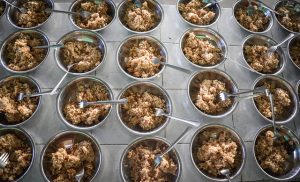Lectionary Reflection for the Second Sunday of Advent, Year C
December 6, 2015
Prepare the way of the Lord, make his paths straight. Every valley shall be filled, and every mountain and hill shall be made low, and the crooked shall be made straight, and the rough ways made smooth; and all flesh shall see the salvation of God. Luke 4b-6
Note: This is the second in a series of Advent reflections focusing on stewardship. Why not cultivate stewardship during this season of waiting and anticipation? The lessons for Year C offer a treasure trove of options to help congregants experience the joy of generosity.
Does the world produce enough food to feed everyone? Google this question and you’ll quickly learn that yes, indeed, we do produce enough food to feed every single person on earth. Even so, almost 800 million people are chronically undernourished–most of them in developing countries. One in nine persons in the world does not have enough to eat. That means a lot of children go to bed hungry each night. That means a lot of parents bear the burden of worry and shame of not being able to provide for them. The sad thing is this: It’s really all a matter of distribution.
 Yes, we produce enough food, but because of poverty and waste and strife and greed we fail to distribute the resources so that all may have enough to live. Granted, the problem of distribution is a far greater one than any one of us, or any one of our faith communities for that matter, can tackle. We can, however, learn a thing or two from John the Baptist, from the one who cried out in the wilderness and called for our repentance, and who (as foretold in the words of the prophet Isaiah) came to prepare the way for the Savior of the world. And, we can add our voices to John’s in calling for a turning and a returning to God.
Yes, we produce enough food, but because of poverty and waste and strife and greed we fail to distribute the resources so that all may have enough to live. Granted, the problem of distribution is a far greater one than any one of us, or any one of our faith communities for that matter, can tackle. We can, however, learn a thing or two from John the Baptist, from the one who cried out in the wilderness and called for our repentance, and who (as foretold in the words of the prophet Isaiah) came to prepare the way for the Savior of the world. And, we can add our voices to John’s in calling for a turning and a returning to God.
Advent is the season where we who follow Christ, who look for signs of Christ in the world, and who celebrate Christ’s arrival as a helpless infant can take some time to breath, wait, and take stock of our stewardship of time, talent, and yes, resources. Advent offers 24 days where we can choose to take a slightly or significantly different route to Christmas cheer.
Advent is NOT a season for flogging folks with guilt; after all, there’s enough of that to go around during this season without the church adding to it. Instead we can offer a safe space to rest in Jesus, an opportunity to step away from the carnival of consumption, and a chance to contribute to make the path straight and smooth so that others can see and experience Jesus.
 We are left, then, with a holy tension. As stewards of God’s abundance we can choose to do a “new” thing, or at least a different thing. What if we looked at the road ahead, the days that stand between us and Christmas, as a time to let go of something, to share something, to live more simply, to choose to do less and live more? How would it look to choose joy over stress, peace over pressure, more giving and less getting, and more worship and less worry? What kind of turning might we experience and how might that shape the months and years to come?
We are left, then, with a holy tension. As stewards of God’s abundance we can choose to do a “new” thing, or at least a different thing. What if we looked at the road ahead, the days that stand between us and Christmas, as a time to let go of something, to share something, to live more simply, to choose to do less and live more? How would it look to choose joy over stress, peace over pressure, more giving and less getting, and more worship and less worry? What kind of turning might we experience and how might that shape the months and years to come?
What if, dear friends, we decided this year that our best gift to God and one another might be to actually commit to turning this beautiful broken around, to making that highway straight and smooth so that indeed “all flesh shall see the salvation of God”? After all, it is really all a matter of distribution. God gives. Our job is to let go and trust God’s abundance. Blessings on your bold and faith-full proclamation!
In Worship
Why not use today’s worship as an opportunity to give congregants a choice to make this Advent a simpler season? Consider contrasting some hunger and consumption facts with alternative choices. You might print up a few business size cards with the facts on one side and an Advent alternative on the other side. Here are a few examples to get your creative juices going:
FACT: According to worldhunger.org, “Poverty is the principal cause of hunger. The causes of poverty include poor people’s lack of resources, an extremely unequal income distribution in the world and within specific countries, conflict, and hunger itself.”
CHOICE: I choose to skip purchasing coffee or lunch out today and will instead donate that amount of money to ELCA World Hunger or Bread for the World (or another charity of your choosing). Instead I will take my coffee from home or skip it altogether, giving thanks that I have access to clean water and coffee to drink.
FACT: 150 million chocolate Santas are produced annually, the vast majority of which are not made from fairly traded cocoa and which may be produced using child labor.
CHOICE: I choose to buy only fair trade chocolates this Christmas to ensure that growers are paid fairly and children are not abused by unfair labor practices.
FACT: The average per person spending on gifts for the holidays is almost $800, and Americans will spend more on the holidays than the GDP of more than 100 countries.
CHOICE: I choose to make at least one gift or give a gift of time or an experience (date night, family outing, free hugs for a year, painting or drawing, for example) to every person on my gift list in lieu of a purchased item.
With Youth
Consider this week’s Psalm (Luke 1:68-79) with your youth. This the Canticle of Zachariah, spoken/sung after John the Baptist’s father receives his voice back and prophecy is fulfilled. Focus on verses 76-79 that begin “And you, child, will be called the prophet of the Most High; for you will go before the Lord to prepare his ways…” Invite youth to consider how they, too, might be called to be prophets announcing Jesus to a hungry and hurting world. Think about what it means to have a destiny and vocation to be a prophetic voice, to serve God vocationally, and to announce the way of Jesus. If you have youth who may be considering ministry or those you might feel are likely candidates, this is a good passage to use to lift up discernment.
With Children
Clean and Precious Children: If you have a long period of time with the children, consider making simple soap with them as an illustration of the Old Testament lesson (Malachi 3:1-4). You can show them some basic lye or pumice-laden soap and explain that fuller’s soap was strong stuff for preparing new cloth. How does God clean and refine and shape us to be his people? We begin in the waters of baptism and continue to be cleaned, scrubbed, pounded, and bleached throughout our lives on this earth as we follow Jesus. Here’s a simple soap recipe if you have time. Here’s a simple glycerin soap recipe that can be started in Sunday school or a activity period. If you don’t have much time, consider making some yourself and give each child a sample to take home. Wrap the soap in parchment paper with a gold or silver ribbon. Remind them that they’ve already been washed clean in baptism, so every time they wash their hands or face they can remember their baptism and know that in Christ they are clean and precious as gold or silver.
Photos: BrunoBrunan, Feed My Starving Children, and S. Blezard, Creative Commons. Thanks!




I am stunned and saddened to find that this lovely woman and pastor who has guided me to sharing the word in such a meaningful way with children so many times has died…too young I might add! And yet, we believe and in spite of the sadness I feel over this I look forward to seeing her at the resurrection. Bless you who she loved and who grieve her most profoundly now.